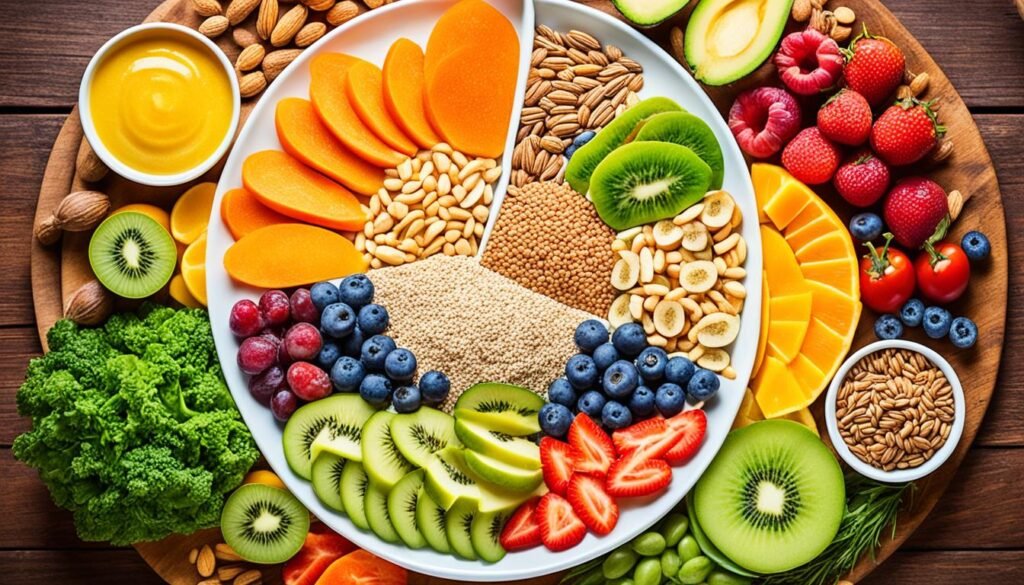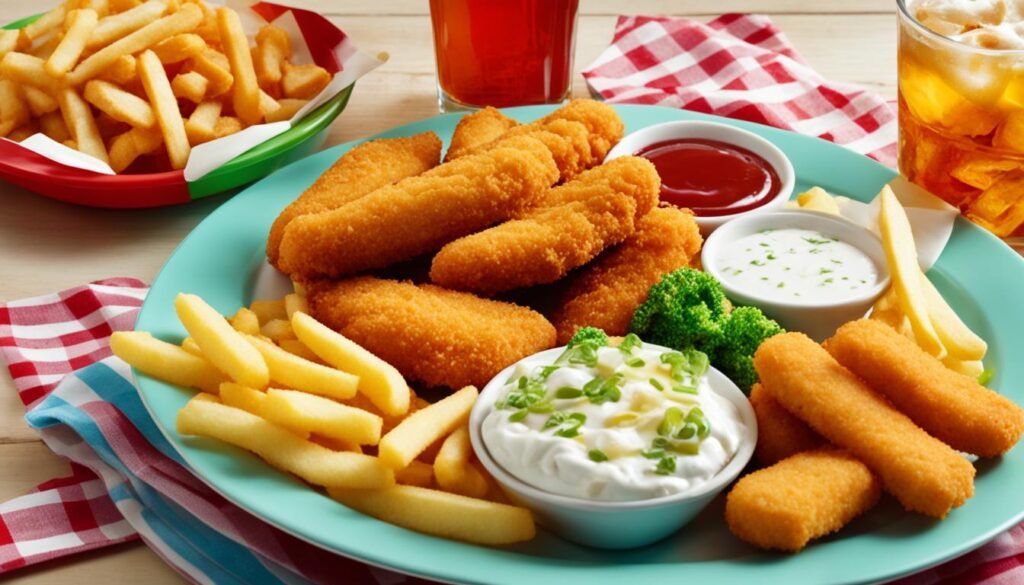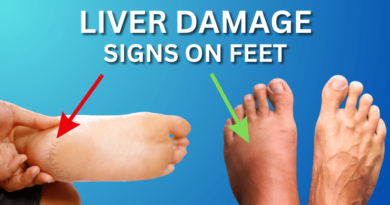Foods to Eat to Cure Fatty Liver – Learn Now!
Are you looking for natural ways to promote fatty liver and improve your liver health? Specifically, what foods to eat to cure fatty liver? Incorporating specific foods into your diet can play a crucial role in supporting liver function and healing. By nourishing your liver with the right nutrients, you can aid in the recovery from fatty liver disease. In this article, we will explore the top foods for fatty liver recovery and how they can contribute to your overall liver health.
With proper dietary choices, you can take control of your liver health and work towards a healthier you. Let’s dive into the world of liver-supportive foods and discover the power they hold in supporting fatty liver recovery.
Key Takeaways:
- Proper nutrition plays a vital role in fatty liver recovery.
- Incorporating specific foods into your diet can support liver healing and optimal functioning.
- Fiber-rich foods, healthy fats, and antioxidant-rich fruits and vegetables are beneficial for fatty liver recovery.
- Hydration and the consumption of omega-3 fatty acids also play a crucial role in liver health.
- It is important to be cautious of herbal supplements and consult with a healthcare professional before incorporating them into your routine.
Understanding Fatty Liver and the Importance of Diet
In order to comprehend the impact of diet on liver health, it is essential to understand the nature of fatty liver disease. The liver, a vital organ responsible for numerous bodily functions, including detoxification and metabolizing nutrients, can be adversely affected by the excessive accumulation of fat. This leads to a condition known as fatty liver disease. The progression of this disease and its potential complications can be influenced significantly by dietary choices.
Role of the Liver in Body Functions and Health
The liver serves as a central hub in maintaining overall health and well-being. It plays a crucial role in detoxifying harmful substances, metabolizing carbohydrates, fats, and proteins, producing bile for efficient fat digestion, and storing essential vitamins and minerals. The liver’s ability to carry out these functions effectively is essential for the proper functioning of the entire body.
How Diet Affects Liver Health
The impact of diet on liver health cannot be overstated. Consuming a diet high in saturated fats, sugars, and excessive salt can contribute to the accumulation of fat in the liver and trigger inflammation, leading to the development of fatty liver disease. On the other hand, a well-balanced diet consisting of nutrient-rich foods supports the liver’s ability to function optimally and protect against liver damage.
Progression of Liver Disease and Dietary Impact
The progression of liver disease is closely linked to dietary choices. Research has shown that a diet high in unhealthy fats and sugars not only accelerates the accumulation of fat in the liver but also increases the risk of more severe forms of liver disease. Adhering to a healthy diet, rich in fruits, vegetables, whole grains, lean proteins, and healthy fats, can aid in preventing the progression of liver disease and promoting liver health.

Foods That Aggravate Liver Health
When it comes to liver health, certain foods and lifestyle choices can have a detrimental impact on the well-being of this vital organ. In this section, we will explore the negative effects of high-fat intake, excessive sugar and salt consumption, and the risks associated with consuming refined sugars and processed foods. Understanding how these factors aggravate liver health is essential for making informed dietary choices and promoting overall well-being.
High-Fat, Sugar, and Salt Intake
A diet high in fat, sugar, and salt can overload the liver, leading to inflammation and liver damage. Consuming excessive amounts of these substances can promote the development and progression of fatty liver disease. High-fat foods, such as fried foods, fatty meats, and full-fat dairy products, can contribute to fat accumulation in the liver. Similarly, consuming sugary foods and beverages, as well as foods with high salt content, can exacerbate liver health issues. It is crucial to limit the intake of these foods and opt for healthier alternatives to support liver health.
Alcohol’s Damaging Effects on the Liver
Alcohol consumption is a leading cause of liver disease and can have severe damaging effects on this vital organ. Excessive alcohol intake can lead to alcoholic fatty liver disease, a condition characterized by the accumulation of fat in the liver. Over time, this can progress to more severe liver conditions, such as alcoholic hepatitis and cirrhosis. It is important to be aware of the risks associated with alcohol consumption and to practice moderation or abstain from alcohol altogether to protect liver health.
The Risk of Refined Sugars and Processed Foods
The consumption of refined sugars and processed foods poses a significant risk to liver health. Foods high in refined sugars, such as sugary snacks, sodas, and desserts, can contribute to insulin resistance and metabolic syndrome, both of which are linked to the development of fatty liver disease. Processed foods, which are often high in additives, preservatives, and unhealthy fats, can also increase the risk of liver damage. Opting for whole, unprocessed foods and limiting sugar intake can help protect liver health and prevent the progression of liver diseases.

What Foods to Eat to Cure Fatty Liver?
Certain foods can play a crucial role in repairing fatty liver and restoring optimal liver function. By incorporating these foods into your diet, you can support your liver’s healing process and improve overall liver health. Let’s explore the top foods for fatty liver repair and how they contribute to liver health.
Fiber-Rich Foods for Optimal Liver Function
Fiber is essential for digestive health and can also promote optimal liver function. Consuming fiber-rich foods helps regulate blood sugar levels, manage weight, and reduce inflammation. Some examples of fiber-rich foods for liver health include:
- Whole grains, such as oats, brown rice, and whole wheat bread
- Legumes, including beans, lentils, and chickpeas
- Fruits and vegetables, especially those with high fiber content such as broccoli, Brussels sprouts, and raspberries
Healthy Fats that Aid in Liver Recovery
Contrary to popular belief, not all fats are bad for your liver. In fact, healthy fats play a crucial role in liver recovery. These fats provide energy, support cell growth, and help your liver function optimally. Incorporate the following foods into your diet for their healthy fat content:
- Avocados
- Fatty fish, such as salmon, trout, and mackerel
- Nuts and seeds, including walnuts, chia seeds, and flaxseeds
Antioxidant-Rich Fruits and Vegetables
Antioxidants are essential for liver health as they help protect the liver from oxidative damage caused by free radicals. Including antioxidant-rich fruits and vegetables in your diet can support liver health and promote its healing process. Some examples of antioxidant-rich foods for liver health include:
- Berries, like blueberries, strawberries, and blackberries
- Leafy greens, such as spinach, kale, and Swiss chard
- Citrus fruits, such as oranges, lemons, and grapefruits
By incorporating these fiber-rich foods, healthy fats, and antioxidant-rich fruits and vegetables into your diet, you can provide the necessary nutrients for fatty liver repair and support optimal liver function.
The Impact of Hydration and Omega-3 Fatty Acids
In addition to a healthy diet, proper hydration and the consumption of omega-3 fatty acids can have a positive impact on liver health. Staying hydrated helps the liver function optimally by aiding in waste removal and detoxification processes. Omega-3 fatty acids, found in fatty fish and certain seeds, have anti-inflammatory properties and can help reduce inflammation and promote liver health.
Hydration is crucial for maintaining optimal liver function. Water is essential for carrying nutrients to the liver and aiding in the removal of waste products. It helps flush out toxins and supports the liver’s detoxification processes. By staying hydrated, you are providing the necessary support for your liver to perform its vital functions and maintain its overall health.
Omega-3 fatty acids are a type of polyunsaturated fat that have been shown to have numerous health benefits, including promoting liver health. These healthy fats can help reduce inflammation in the liver and decrease the risk of liver disease. Cold-water fatty fish, such as salmon, mackerel, and sardines, are excellent sources of omega-3 fatty acids. Additionally, certain seeds, such as flaxseeds and chia seeds, are rich in omega-3s.
The combination of proper hydration and the consumption of omega-3 fatty acids can support liver health and contribute to overall well-being.
By incorporating hydration and omega-3 fatty acids into your daily routine, you can help protect and support your liver. Remember to drink an adequate amount of water throughout the day and include sources of omega-3 fatty acids in your diet. As always, it is essential to consult with a healthcare professional before making any significant changes to your diet or lifestyle, especially if you have pre-existing liver conditions.
Natural Remedies and Supplements for Liver Health
Alongside a healthy diet, natural remedies and supplements can provide additional support for liver health. Vitamin E and other antioxidants have been shown to have protective effects on liver cells, reducing inflammation and oxidative stress.
Research has demonstrated that Vitamin E can help prevent and treat liver damage caused by various factors, including alcohol consumption and fatty liver disease. This powerful antioxidant works by neutralizing harmful free radicals and reducing inflammation in the liver.
In addition to Vitamin E, other antioxidants are also beneficial for liver health. These include vitamin C, vitamin A, and beta-carotene. These antioxidants help combat oxidative stress and protect liver cells from damage.
It is important to note that not all herbal additions are beneficial for liver health. While some herbal supplements, such as milk thistle, dandelion root, and turmeric, have shown potential benefits for liver health, others may potentially be harmful. It is crucial to consult with a healthcare professional before taking any herbal supplements to ensure their safety and effectiveness.
In this section, we will explore the power of Vitamin E and antioxidants for liver health and discuss the potential benefits and risks of herbal additions for liver health.
Conclusion
Fatty liver disease is a prevalent condition that can have serious health implications if not properly managed. It is important to take proactive steps to promote liver health and support the recovery process. One of the key ways to achieve this is through a well-balanced diet consisting of foods that are beneficial for fatty liver recovery.
Incorporating fiber-rich foods, such as whole grains, legumes, and fruits, can help promote optimal liver function and aid in the healing of fatty liver. These foods provide essential nutrients and contribute to healthy digestion. Additionally, including healthy fats, like those found in avocados, nuts, and olive oil, can support liver recovery and reduce inflammation.
Antioxidant-rich fruits and vegetables, such as berries, leafy greens, and cruciferous vegetables, provide vital nutrients that help protect the liver from oxidative stress and damage. Staying hydrated is also crucial for liver health, as proper hydration aids in waste removal and detoxification processes.
Alongside a nutrient-rich diet, natural remedies and supplements can offer additional support. Vitamin E and other antioxidants have shown protective effects on liver cells and can help reduce inflammation and oxidative stress. However, it is important to be cautious when it comes to herbal additions, as some may be harmful to the liver.
In conclusion, by incorporating a well-balanced diet focused on liver-supportive foods, staying properly hydrated, and considering natural remedies and supplements under professional supervision, individuals can support their liver’s recovery process and improve overall liver health. Remember, proper dietary and lifestyle choices are essential for the successful management and recovery of fatty liver disease.



